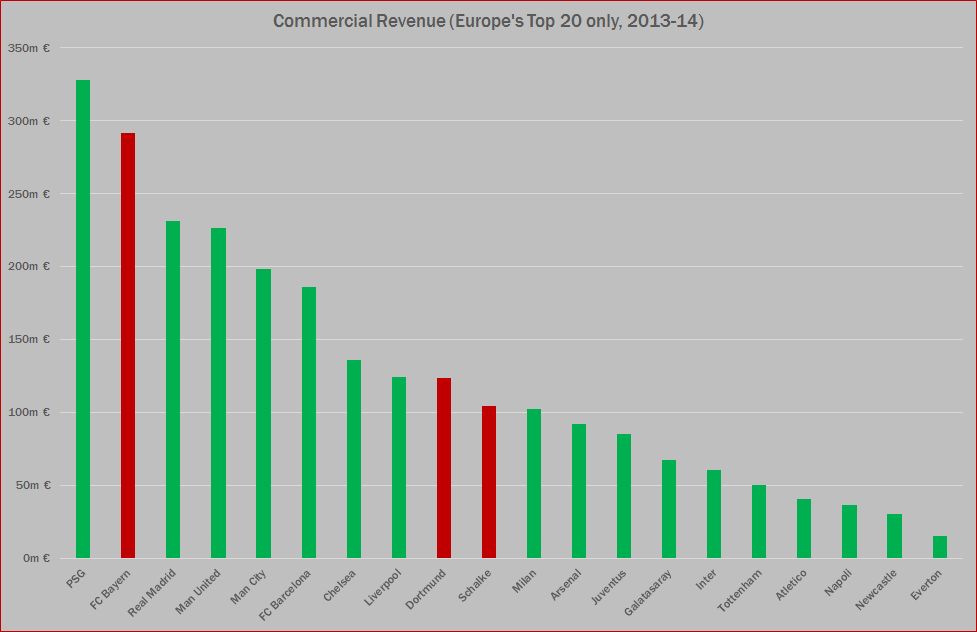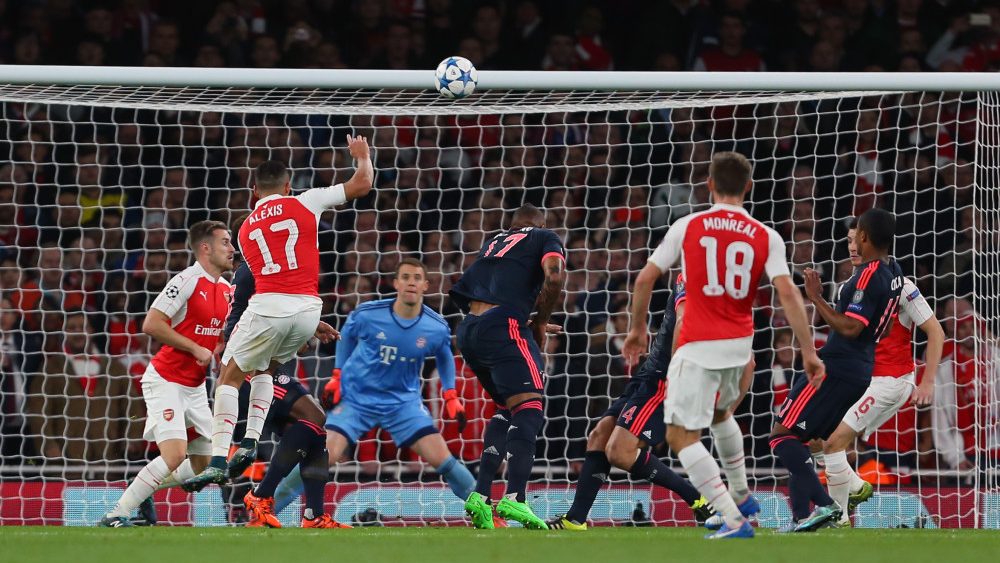State Of The Bundesliga – Part One
Commercial revenue
What’s behind commercial revenue? Mostly sponsorship deals. The most understandable and obvious key figure of this surely is the shirt sponsor but there’s a lot more behind it, mostly things that fans hardly ever hear about.
Commercial revenue is the least league-dependent of the three factors. It is more important to have a strong brand, international fame and of course a great business network. Being a cozy family-run club won’t land you a €25m shirt sponsorship deal. Acting like a real businessman will. Or you invite an investor into your club and look for ways to bypass the Financial Fair Play, that’s where commercial revenue is really useful. Why? Because, as mentioned before, it’s both intransparent and independent.
Intransparent might be a harsh word. You can’t exactly hide the numbers, at least not from the people who have an actual interest in seeing them (not us fans). But commercial revenue is incredibly arbitrary. What made Telekom decide to pay Bayern €30m a year instead of €25m? There are no rules or a magic allocation formula that allow third parties to understand how that amount was created.
Furthermore, commercial revenue is also highly independent from the club’s country of origin. Leagues aren’t closed economies in this regard, any company can sponsor any club regardless of location. Football sponsorship is a globalized market. Because of that, companies will choose to reward the (for them) most attractive clubs regardless of domestic league status. Sure, it won’t hurt to play in the Premier League instead of the Jupiler League, but it’s not the main factor. What matters is your international status and your presence on the European stage.
Considering those points, it should be no surprise that commercial revenue is an important part mainly for clubs of an underprivileged league in terms of broadcasting money (more about that in a bit). Almost 70% of PSG’s revenue is commercial-based. In Germany, you have Bayern at 60% and Dortmund/Schalke at close to 50%. The average % of the entire top 20? 37%.
In absolute numbers, Bayern and PSG have the highest commercial revenue of all European teams.
 Bundesliga teams (marked in red) do well here, Bayern in particular.
Bundesliga teams (marked in red) do well here, Bayern in particular.The strategies of the two clubs are rather different. Bayern have monetized strong bonds with certain companies such as Adidas or Audi, taking advantage of decades of cooperation. A classic networking move of businessmen looking to benefit from each other.
PSG on the other hand present a strongly artificial growth. Were they, now two seasons ago, attractive and popular enough to lead the entire continent in commercial revenue? Highly doubtful, not after the massive struggles the club went through only a few years prior. And those opinions are indeed confirmed when you look at the revenue growth.
The aforementioned top 20 had an average growth of +78% from 2010 to 2014. A success story like Dortmund had a revenue growth of +145%. Even the subsidized Man City “only” grew 171% in those five years. The five-year revenue growth of PSG? A staggering +478%. Within five years, they went from “poorer than Everton and Napoli” to “as rich as Bayern and Barca”. Artificial growth while avoiding repercussions, done to perfection.
This surely is the factor that distorts the balance within the Bundesliga the most. The gaps are huge, with the difference between a top club and a relegation candidate being up to €100m. And then there’s the additional gap between a top club and Bayern of at least €150m. But can you fix this? It’s close to impossible to limit a club’s commercial revenue so what would be needed is an increased attractiveness for the entire league that makes smaller clubs interesting victims of sponsorships. You decide whether that’s the task of the clubs, the DFL or both.
How much money do TV stations spend on leagues? Read the final page for criticism on the DFL and our verdict!












Interesting article. Sounds like Bayern and BVB need to get better negotiators (see NBA/NFL).
Btw, if you want to say the opposite of transparent, you can use the words “opaque” or non-transparent.
Cheers